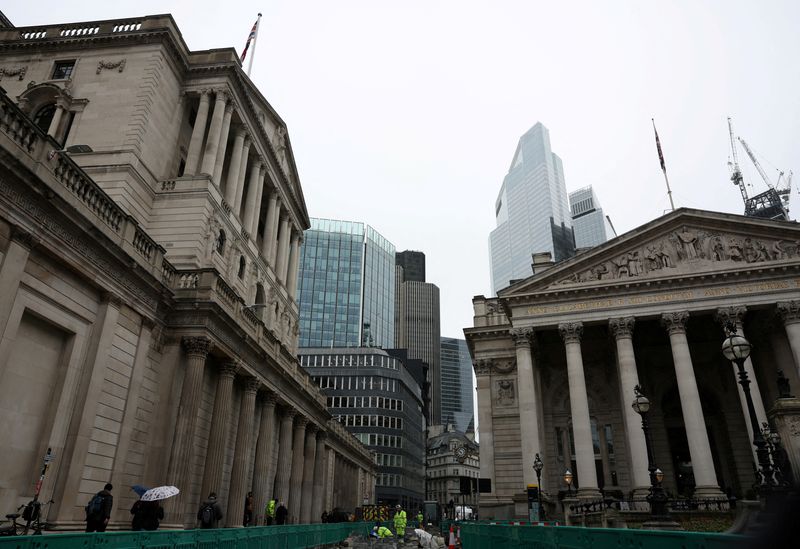By Huw Jones
LONDON (Reuters) -Regulators need broader oversight of financial firms to prevent a crisis in the vast non-bank sector turning into a credit crunch and wreaking havoc on the economy, Britain's central bank said on Monday.
The Bank of England was forced to step in and buy UK government bonds in September 2022 after Prime Minister Liz Truss unveiled unfunded tax cuts, sending yields soaring and leaving liability-driven investment (LDI) funds scrambling to find extra collateral to cover positions.
That bruising experience made it more determined to shine a light on "non-banks" like insurers, pension schemes, asset managers and funds that now make up about half of global financial assets but are less regulated than lenders, particularly when providing credit.
The central bank has launched a stress test to harvest data on links between banks and the non-bank financial intermediation (NBFI) sector to help convince international regulators, particularly securities watchdogs who regulate markets, to take joint action.
BoE Deputy Governor Sarah Breeden said on Monday that further research was needed to identify gaps in the data and increase resilience in a sector that provided nearly all of the 425 billion pounds ($539 billion) net increase in UK business lending since 2008.
"These gaps in our knowledge has meant that we have been largely building resilience in market-based finance in response to crises, whereas we should be looking to build resilience ahead of vulnerabilities crystalising," Breeden told a BoE event.
"Work which develops our understanding of the risks and interconnections of the system should help us to build a proactive case for policy action on NBFI before stress crystalises," she said, adding market based finance, rather than typically banks, had the potential to become the source of a "credit crunch".
NON-BANK RULES 'BEYOND REACH'
Claudio Borio, head of the monetary and economic department at the Bank for International Settlements, a forum for central banks, said central banks were "left holding the can" due to unresolved fragilities in non-banks that have not been sufficiently tackled.
"A fit for purpose regulatory framework would involve a mix of entity based and activity based approaches... it will likely remain beyond reach unless securities regulators have financial stability as part of their mandate, this has been the key which has been holding back progress," Borio told the conference.
A central banker said that one way to overcome this would be to use capital and liquidity rules to influence how banks, which central banks regulate, interact with non-banks.
The BoE has set out tougher liquidity guidance for LDI funds and money market funds, but it needs parallel EU action to be fully effective given many of the funds are listed there.
The U.S. Treasury-led Financial Stability Oversight Council in November agreed to ramp up oversight of non-banks, triggering a backlash from big funds that bristle at the prospect of bank-like rules.

Separately on Monday, the G20's Financial Stability Board said it was pursuing a comprehensive work programme to enhance non-bank liquidity resilience, and would deliver a progress report in July.
($1 = 0.7885 pounds)